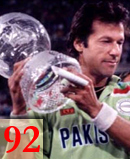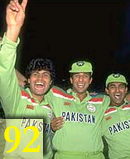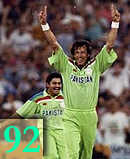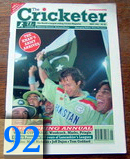

Cricket World Cup Live Audio Video

Broadcast from 2007 March 13 to April 28
Cricket World Cup on TV, Internet and Mobile Phones
The ICC Cricket World Cup All Inclusive Package $199.95World Cup Cricket Live on TV: Live Broadcasting
TV : All Live Matches, Full Replays, Highlights, Interactive TV Application - Get Dish + Full World Cup Cricket PackageWorld Cup Cricket on Internet: Live Streaming
Internet: Full coverage (limited to one Internet Address), Interactive Highlights, Live audio - Get Dish + Full World Cup Cricket PackageWorld Cup Cricket on Mobile: Live Audio
Mobile: Ball-by-Ball coverage on your mobile phone, Discounted access to unlimited SMS updates - Get Dish + Full World Cup Cricket PackageBenson and Hedges World Cup Cricket 1992, Australia & New Zealand
Dates: 22 February 1992 to 25 March1992
Teams: West Indies, England,India, Pakistan, Australia,
New Zealand, Sri Lanka, Zimbabwe & South Africa.
ICC Cricket World Cup
World championship of men's One Day International cricket
World Cup Cricket history, champions | World Cup Cricket facts, trivia | World Cup Cricket records before 2007 | 2007 World Cup Cricket records | World Cup Cricket 1975 | World Cup Cricket 1979 | World Cup Cricket 1983 | World Cup Cricket 1987 | World Cup Cricket 1992 | World Cup Cricket 1996 | World Cup Cricket 1999 | World Cup Cricket 2003 | World Cup Cricket 2007 | World Cup Cricket 2011 | World Cup Cricket 2015 | World Cup Cricket 2019World Cup Cricket 1992



Pakistan Won the World Cup
After the manner of the Olympic Games, cricket’s World Cup quadrennially grows larger and more spectacular. The event, staged in Australia (25 matches) and New Zealand (14 matches) in 1992, featured, for the first time, all eight Test-playing teams, with aspiring Zimbabwe taking the number of competing sides to an unprecedented nine. The final was the 39th match. The first two tournaments, in 1975 and 1979 in England, featured only 15 matches, while in 1983 ( England) and 1987 ( India and Pakistan) there were 27.
The fifth World Cup was the first to be played in coloured clothing, with a white ball and some games under floodlights. Although it was again 50 overs a side rather than the original 60, it was generally considered to have been the fairest: each side played all the others once before the top four in the qualifying table played off in the semi-finals. Lasting 33 days from first ball to last, it could be faulted seriously only in the matter of the rules governing rain-interrupted matches.
Recognising the imperfection of a straight run-rate calculation when a second innings has to be shortened after rain, and unable to schedule spare days within the time-frame of the tournament, the World Cup committee adopted a scheme whereby the reduction in the target would be commensurate with the lowest-scoring overs of the side which batted first. Against South Africa in Melbourne, England lost nine overs but their target of 237 was reduced by only 11 runs. When the teams next met, in the Sydney semi-final, another rain pause, this time at the climactic moment, led to an uproar which echoed for weeks afterwards.
Pakistan won the World Cup for the first time, beating England (twice previous finalists, never winners) by 22 runs on a memorably dramatic autumn night in Melbourne, before an Australian limited-overs record crowd of 87,182 who paid $A2 million (£880,000). Almost half of them sat in the newly completed Great Southern Stand, which cost $A140 million and is the largest construction ever conceived for Australian sport. It was further claimed that the global television audience exceeded one billion, in 29 countries. In Pakistan, where it was still early evening, jubilation verging on the hysterical splashed over into the streets, and upon their return the players were placed on the highest pedestals of heroism.
Imran Khan, the captain, in his 40th year and nursing a troublesome right shoulder, unsurprisingly declared this as his finest hour, a claim clearly supported by the pictures of him holding the £7,500 Waterford crystal trophy, eyes wide with exhilaration, after ICC chairman Sir Colin Cowdrey had presented it to him on the MCG dais. This accomplished all-rounder, top-scorer in the final with a measured 72, had urged his young team on through times when it seemed that qualification for the semi-finals was out of the question. They were, he said, to take on the stance and response of the cornered tiger. He dedicated the victory to the cause of a cancer hospital in Lahore for which he was fund-raising in memory of his mother. The World Cup organisers seemed content to overlook Imran’s earlier remark that it was the worst-organised of all the World Cups. He and Javed Miandad (who became the highest overall run-scorer) alone have played in all five tournaments.
Excitement was high from the opening day, when New Zealand caused the first upset by beating Australia, the holders and favourites, by a comfortable margin at Auckland. Led by Martin Crowe, who made a century, New Zealand were initiating a remarkable run of victories on their slow pitches, Patel bowling off-spin at the start of the innings, followed by a bevy of harmless-looking medium-pacers challenging batsmen to come at them. Crowe’s brilliant batsmanship and imaginative command in the field, augmented by the shameless six-hitting of opener Greatbatch, who earned a place only when Wright was injured, took New Zealand almost to the ultimate glory. The co-hosts won their first seven matches, and were not harmed by defeat (by Pakistan) in the eighth, for it assured them of a home semi-final. The sub-plots were multiple, for Pakistan, through this victory at Christchurch, managed to reach the semi-finals … so long as Australia (who had just lost their last chance) beat West Indies at Melbourne a few hours later. Boon’s century, his second of the series, and Whitney’s four wickets ensured this, putting West Indies out of the competition too.
Australia had started as favourites, but their approach was too inflexible and their form too fickle. New strategies had not so much passed them by as struck no receptive chords in captain Allan Border or coach Bob Simpson. There had been a reluctance to drop the faithful Marsh, who was taking far too much time over his runs, and Simon O’Donnell, voted top player the previous season, was not even chosen in the squad. The nation was mortified as the defeats piled up, the only victory in Australia’s first four matches coming by a solitary run in the most thrilling of all the finishes: at Brisbane, when the last ball seemed successively to be a winning boundary for India, then a catch, then again a spillage into the boundary gutter, with Steve Waugh’s long recovery throw perhaps too wide, but gathered by substitute wicket-keeper Boon, who made ground to beat the batsman by a few inches. Towards the end of the competition, Australians had been compelled to adopt other allegiances, with no small amount of sympathy being extended South Africa’s way.
Readmitted to the international brotherhood after 21 years of political isolation, South Africa, led by Bloemfontein-born former Australian Test batsman Kepler Wessels, were an unpredictable commodity. They had won one of their three introductory limited-overs matches in India in some style three months previously. Now, overseen by coach Mike Procter, one of the world’s greatest cricketers at the time of South Africa’s expulsion, and spearheaded by the speedy Donald, they stepped coolly on to the stage and beat Australia by nine wickets before a clamorous crowd of almost 40,000 at Sydney, proportionate noise issuing from the throats of hundreds of South African supporters, some of them now resident in Australia. Wessels’s partner at the end was Peter Kirsten, who was left out of the original tour squad but was to average 68.33 in the preliminary matches.
Setbacks against New Zealand and Sri Lanka were put behind them as South Africa won their historic encounter with West Indies in a cordially conducted match at Christchurch, following this with a rain-assisted victory over Pakistan at Brisbane, where Jonty Rhodes, already having attracted notice by his electrifying fielding, immortalized himself with an airborne demolition of the stumps to run out Inzamam-ul-Haq. Their place in the semi-finals was secured with victory over India in a shortened match at Adelaide, only for their campaign to be ended cruelly by the sudden heavy shower which fell on the SCG just before 10 p.m., transforming a requirement of 22 off 13 balls to a mocking 21 off one. The crowd’s frustration and hostility focused upon the England players in lieu of the rule-makers, while the South Africans absorbed their acute disappointment with a dignified and somehow joyous lap of honour. Beyond the bounds of cricket, it was believed that their success in the tournament had had an influence on the crucial referendum which decided whether President de Klerk’s reforms were to be continued. Support for his progressive dismantling of apartheid was shown in a substantial majority of the white population’s votes, some of it unquestionably swayed by live pictures from the far side of the Indian Ocean which showed the national team competing popularly and successfully after having been excommunicated for so long.
The odds after two weeks of competition were affected by the vacillating form most particularly of India and West Indies, both past winners. Reshaped after the jettisoning of several senior players, and led by an out-of-touch Richie Richardson, West Indies won their first match convincingly by making 221 without losing a wicket. This was not against the lesser Zimbabwe or Sri Lanka. It was against Pakistan, the eventual champions. Thereafter they seemed out of sorts, though Brian Lara, the flowery left-hander, finished with four half-centuries. India lost a tight opening match against England, beat Pakistan, who fell apart under the Sydney lights, but were themselves soon to fall by the wayside through poor fielding and an indecisiveness in all departments.
Sri Lanka managed two victories, scoring 313 at New Plymouth to deny Zimbabwe what had seemed a certain triumph given the weight of their own innings, centurion Andy Flower having had his effort capitalized by Andy Waller’s 32-ball half-century. Sri Lanka’s other success was against South Africa at Wellington, when Ranatunga steered them home by three wickets with only a ball to spare.
The most unexpected result came on the last day of the qualifying matches, when Zimbabwe, having made only 134 on a sporting pitch at Albury, overthrew England by nine runs, Eddo Brandes taking the bowling honours. England could afford to lose, as was the case in their previous match, against New Zealand, although the long run of success which began when they landed in New Zealand for their Test-match tour as the year opened was now broken and in urgent need of repair, particularly as several key players were carrying injuries. The somewhat fortuitous semi-final victory over South Africa restored their direction even if it could not dispel the accumulated weariness. In retrospect, they might have looked back upon their crushing defeat of Australia as their sweetest moment.
Graham Gooch’s combination became favourites when Australia began to crack. The depth of batting and breadth of bowling alternatives made possible by so many all-rounders, together with the blend of experience and, in key positions, athleticism in the field, gave England the appearance of certain finalists and probable trophy-winners. Fatigue and Pakistan’s inspired surge were to deny them on the night.
Not unexpectedly, the World Cup was given wide coverage in Australasia, though Channel 9’s television cameras were installed only at venues where the organisers felt the interest would be greatest. Matches which they did cover were comprehensively treated, although this was of little comfort to the legions of cricket enthusiasts in Britain who had no access to the BSkyB satellite television reception which was beamed almost around the clock. Apart from two-minute news segments, only half an hour of highlights of the final was shown on BBC TV. Some of the lower-shelf fixtures were staged in rural areas, Albury’s reward being the historic upset when Zimbabwe beat England, contrasting with Mackay’s fate after all the months of preparation, which was a washout after two balls.
The emergence of new faces was refreshing. Hudson, Snell and Pringle from South Africa, Lara from West Indies, Inzamam-ul-Haq, Mushtaq Ahmed and Aamir Sohail from Pakistan all made a mark, five of them still not Test players. And electrifying incidents were captured not only in the television replays but subsequently in the proliferation of commemorative video-cassettes. Rhodes’s flying run-out at Brisbane was memorable, but wicket-keeper More’s back-flick to run out Crowe at Dunedin may well have been the most extraordinary dismissal of all. Not that Border’s throwing accuracy, such as when he ran out Azharuddin at Brisbane, will soon be forgotten, or the stumping of Harris from a Mushtaq Ahmed wide, or the demolition of Botham’s middle stump (which contained the miniature TV camera) by McMillan, or some of Healy’s catches behind the wicket, or Mushtaq’s googly to defeat Hick and Wasim Akram’s wicked in-swinger to bowl Lewis in the final.
The pool of umpires from the competing nations brought an added flavour of internationalism without quite ensuring the exclusion of errors, some of them quite glaring. Messrs Bucknor and Shepherd were generally regarded as the most reliable. The no-ball penalty for shoulder-high bouncers was not always consistently interpreted, but ensured that the matches were safeguarded from the excesses so often witnessed in the recent past, especially at Test level.
Perversely, as in 1987, neither host nation won through to the final. Seriously stunned in 1987 by their loss to Australia in the semi-final at Lahore, Pakistan somehow lifted themselves in the 1992 tournament after having won only one of their first five matches. Handicapped by the absence through injury of their outstanding fast bowler, Waqar Younis, they were spurred on by their rarefied captain, Imran Khan. As far as bowling strategy went they played aggressively throughout – and with the bat too, once the disciplined foundation had been laid. There was satisfaction in seeing the best two teams in the final, and, for the rare objective onlooker, a slight sadness that only one of them could triumph. For a month, the World Cup not only generated large profits but stirred many hearts and touched countless nerve-ends around the cricket world.
Cricket World Cup 1992 Finals Score Board

Pakistan beat England by 22 runs
Despite Australia's failure to reach the final, a record World Cup final crowd of more than 85,000 greeted Pakistan and England at the MCG.After a poor start during which Derek Pringle's suffocating military medium pace claimed both openers, Pakistan soon found their way, with captain Imran Khan to the fore.
Imran and Javed Miandad shared a third-wicket partnership of 139 that set Pakistan back on the right track.
And their innings finished with a flourish when Inzamam-ul-Haq scored 42 off 35 balls with Wasim Akram chipping in with a quickfire 33 off only 19.
And Wasim was soon in the action with the ball, dismissing Ian Botham for a duck in the first over of England's innings.
The left-armer's next wickets settled the match. When he clean bowled Allan Lamb and Chris Lewis in consecutive balls, England were 141 for six with the run-rate climbing.
Despite the best efforts of Neil Fairbrother and the tail, England never recovered - much to the delight of the majority of the Melbourne crowd.
Man of the Match: Wasim Akram
|
249 for 6 (50.0 overs) |
|
227 all out (49.2 overs) |
| Batsman |
|
Runs |
Balls |
4s |
6s |
|
| Aamer Sohail | c Stewart | b Pringle | 4 |
19 | 0 | 0 |
| Rameez Raja | lbw | b Pringle | 8 |
26 | 1 | 0 |
| Imran Khan | c Illingworth | b Botham |
72 |
110 | 5 | 1 |
| Javed Miandad | c Botham | b Illingworth | 58 |
98 | 4 | 0 |
| Inzamam-ul-Haq | b Pringle | 42 |
35 | 4 | 0 | |
| Wasim Akram | run out | 33 | 19 | 4 | 0 | |
| Saleem Malik | not out | |
0 |
1 | 0 | 0 |
| Extras | |
7nb 6w 19lb | 32 | |
||
| Total | |
for 6 | 249 | |
||
|
|
Live Cricket
| Batsman |
|
Runs |
Balls |
4s |
6s |
|
| GA Gooch | c Aaqib Javed | b Mushtaq Ahmed | 29 |
66 | 1 | 0 |
| IT Botham | c Moin Khan | b Wasim Akram |
0 |
6 | 0 | 0 |
| AJ Stewart | c Moin Khan | b Aaqib Javed |
7 |
16 | 1 | 0 |
| GA Hick | lbw | b Mushtaq Ahmed | 17 |
36 | 1 | 0 |
| NH Fairbrother | c Moin Khan | b Aaqib Javed |
62 |
70 | 3 | 0 |
| AJ Lamb | b Wasim Akram |
31 |
41 | 2 | 0 | |
| CC Lewis | b Wasim Akram | 0 |
6 | 0 | 0 | |
| DA Reeve | c Rameez Raja | b Mushtaq Ahmed | 15 |
32 | 0 | 0 |
| DR Pringle | not out | |
18 |
16 | 1 | 0 |
| PAJ DeFreitas | run out | 10 | 8 | 0 | 0 | |
| RK Illingworth | c Rameez Raja |
b Imran Khan | 14 |
11 | 2 | 0 |
| Extras | |
6nb 13w 5lb | 24 | |
||
| Total | |
all out | 227 | |
||
|
|
Live Cricket
Pakistan Team: Aamer Sohail, Rameez Raja, Imran Khan, Javed Miandad, Inzamam-ul-Haq, Wasim Akram, Saleem Malik, Ijaz Ahmed, Moin Khan, Mushtaq Ahmed, Aaqib Javed.
Englan Team:GA Gooch, IT Botham, AJ Stewart, GA Hick, NH Fairbrother, AJ Lamb, CC Lewis, DA Reeve, DR Pringle, PAJ DeFreitas, RK Illingworth.
Summary of results
England v India at Perth - February 22, 1992
England won by 9 runs. England 236-9 (50 ov); India 227
(49.2 ov).
New Zealand v Australia at Auckland - February 22, 1992
New Zealand won by 37 runs. New Zealand 248-6 (50 ov);
Australia 211 (48.1 ov).
Pakistan v West Indies at Melbourne - February 23, 1992
West Indies won by 10 wickets. Pakistan 220-2 (50 ov);
West Indies 221-0 (46.5 ov).
Sri Lanka v Zimbabwe at New Plymouth - February 23, 1992
Sri Lanka won by 3 wickets. Zimbabwe 312-4 (50 ov); Sri
Lanka 313-7 (49.2 ov).
New Zealand v Sri Lanka at Hamilton - February 25, 1992
New Zealand won by 6 wickets. Sri Lanka 206-9 (50 ov);
New Zealand 210-4 (48.2 ov).
Australia v South Africa at Sydney - February 26, 1992
South Africa won by 9 wickets. Australia 170-9 (49 ov);
South Africa 171-1 (46.5 ov).
England v West Indies at Melbourne - February 27, 1992
England won by 6 wickets. West Indies 157 (49.2 ov); England
160-4 (39.5 ov).
Pakistan v Zimbabwe at Hobart - February 27, 1992
Pakistan won by 53 runs. Pakistan 254-4 (50 ov); Zimbabwe
201-7 (50 ov).
India v Sri Lanka at Mackay - February 28, 1992
No result. India 1-0 (0.2 ov).
New Zealand v South Africa at Auckland - February 29,
1992
New Zealand won by 7 wickets. South Africa 190-7 (50 ov);
New Zealand 191-3 (34.3 ov).
West Indies v Zimbabwe at Brisbane - February 29, 1992
West Indies won by 75 runs. West Indies 264-8 (50 ov);
Zimbabwe 189-7 (50 ov).
Australia v India at Brisbane - March 1, 1992
Australia won by 1 run. Australia 237-9 (50 ov); India
234 (47 ov).
England v Pakistan at Adelaide - March 1, 1992
No result. Pakistan 74 (40.2 ov); England 24-1 (8 ov).
South Africa v Sri Lanka at Wellington - March 2, 1992
Sri Lanka won by 3 wickets. South Africa 195 (50 ov);
Sri Lanka 198-7 (49.5 ov).
New Zealand v Zimbabwe at Napier - March 3, 1992
New Zealand won by 48 runs. New Zealand 162-3 (20.5 ov);
Zimbabwe 105-7 (18 ov).
India v Pakistan at Sydney - March 4, 1992
India won by 43 runs. India 216-7 (49 ov); Pakistan 173
(48.1 ov).
Australia v England at Sydney - March 5, 1992
England won by 8 wickets. Australia 171 (49 ov); England
173-2 (40.5 ov).
South Africa v West Indies at Christchurch - March 5,
1992
South Africa won by 64 runs. South Africa 200-8 (50 ov);
West Indies 136 (38.4 ov).
Australia v Sri Lanka at Adelaide - March 7, 1992
Australia won by 7 wickets. Sri Lanka 189-9 (50 ov); Australia
190-3 (44 ov).
India v Zimbabwe at Hamilton - March 7, 1992
India won by 55 runs. India 203-7 (32 ov); Zimbabwe 104-1
(19.1 ov).
New Zealand v West Indies at Auckland - March 8, 1992
New Zealand won by 5 wickets. West Indies 203-7 (50 ov);
New Zealand 206-5 (48.3 ov).
Pakistan v South Africa at Brisbane - March 8, 1992
South Africa won by 20 runs. South Africa 211-7 (50 ov);
Pakistan 173-8 (36 ov).
England v Sri Lanka at Ballarat - March 9, 1992
England won by 106 runs. England 280-6 (50 ov); Sri Lanka
174 (44 ov).
India v West Indies at Wellington - March 10, 1992
West Indies won by 5 wickets. India 197 (49.4 ov); West
Indies 195-5 (40.2 ov).
South Africa v Zimbabwe at Canberra - March 10, 1992
South Africa won by 7 wickets. Zimbabwe 163 (48.3 ov);
South Africa 164-3 (45.1 ov).
Australia v Pakistan at Perth - March 11, 1992
Pakistan won by 48 runs. Pakistan 220-9 (50 ov); Australia
172 (45.2 ov).
England v South Africa at Melbourne - March 12, 1992
England won by 3 wickets. South Africa 236-4 (50 ov);
England 226-7 (40.5 ov).
New Zealand v India at Dunedin - March 12, 1992
New Zealand won by 4 wickets. India 230-6 (50 ov); New
Zealand 231-6 (47.1 ov).
Sri Lanka v West Indies at Berri - March 13, 1992
West Indies won by 91 runs. West Indies 268-8 (50 ov);
Sri Lanka 177-9 (50 ov).
Australia v Zimbabwe at Hobart - March 14, 1992
Australia won by 128 runs. Australia 265-6 (46 ov); Zimbabwe
137 (41.4 ov).
India v South Africa at Adelaide - March 15, 1992
South Africa won by 6 wickets. India 180-6 (30 ov); South
Africa 181-4 (29.1 ov).
New Zealand v England at Wellington - March 15, 1992
New Zealand won by 7 wickets. England 200-8 (50 ov); New
Zealand 201-3 (40.5 ov).
Pakistan v Sri Lanka at Perth - March 15, 1992
Pakistan won by 4 wickets. Sri Lanka 212-6 (50 ov); Pakistan
216-6 (49.1 ov).
Australia v West Indies at Melbourne - March 18, 1992
Australia won by 57 runs. Australia 216-6 (50 ov); West
Indies 159 (42.4 ov).
England v Zimbabwe at Albury - March 18, 1992
Zimbabwe won by 9 runs. Zimbabwe 134 (46.1 ov); England
125 (49.1 ov).
New Zealand v Pakistan at Christchurch - March 18, 1992
Pakistan won by 7 wickets. New Zealand 166 (48.2 ov);
Pakistan 167-3 (44.4 ov).
Semi-Final: New Zealand v Pakistan at Auckland - March
21, 1992
Pakistan won by 4 wickets. New Zealand 262-7 (50 ov);
Pakistan 264-6 (49 ov).
Semi-Final: England v South Africa at Sydney - March
22, 1992
England won by 19 runs. England 252-6 (45 ov); South Africa
232-6 (43 ov).
Final: England v Pakistan at Melbourne - March 25, 1992
Pakistan won by 22 runs. Pakistan 249-6 (50 ov); England
227 (49.2 ov).



